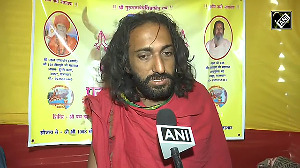One of the world's oldest seats of learning, the ruins of Nalanda University are a true wonder!

All the signboards on the smooth highway as one enters Bihar Sharif-Nalanda from Patna carry the sign 'Ruins of the ancient Nalanda University' alongside names of towns and distances that lie ahead.
There is always a mix of curiosity and excitement in proximity of such timeless heritage sites -- when they leap out from the far corners of the mind and are tantalisingly close.
We were in Nalanda-Rajgir covering the election in Bihar. After finishing an interview with Sandeep Saurav, a professor-turned MLA who made an unsuccessful bid for a MP seat from Nalanda, we took a short detour to see the ruins of one the of the world's oldest universities.

It was a scorching summer day in May. The head/neck had to be covered and bottles of water kept in hand if you did not want to risk a heat stroke.
At the ticket counter, the staff said despite the heat 2,500 people visited every day. Just past the ticket window a large group of Marathi-speaking women sat on the side of the tree-lined, shady path leading to the UNESCO World Heritage Site.
World Heritage Sites signify a remarkable accomplishment of humanity. India ranks fifth with 42 UNESCO sites.
The women chatted with each other in Marathi. The bus with a Maharashtra registration plate was parked at the parking space. The group had travelled over a thousand kilometres from the west to Bihar in the north east, and was delighted to chat with my colleagues in their native Marathi.
They were Buddhists from the Amravati and Ahmednangar districts of Maharashtra who were visiting important sites in Bihar associated with Buddhism.

The district of Nalanda dates back to Lord Buddha and Lord Mahavira's time. Stalls outside the Nalanda University gate sell Buddha statues, prayer wheels, prayer beads, singing bowls, while tourist guides chaperone Japanese tourists who regularly arrive in the city in large groups.
The residential university which is older than Oxford, Cambridge and University of Bologna was established in the early 5th Century.
It had 2,000 teachers and 10,000 students and drew students from China, Korea, Japan, Tibet, Mongolia and South East Asia.
Here are some of the other accomplishments that the uni was famous for -- and reasons why one should visit:

It was the world's premier centre for Buddhist studies and higher learning for 700 years. The curriculum included Buddhist studies, fine arts, medicine, mathematics, politics, literature, astronomy and the art of war.
Aryabhatta, the great mathematician, is said to have taught here.
Huan Tsang, the Chinese philosopher, was a student at Nalanda University for five years and taught here for a year.
It had a large library with hand written Buddhists manuscripts that burned for months after the university was sacked and destroyed by Turkish invaders led by Bakhtiyar Khilji.

After its end in the 13th century, it lay buried in the earth till the Archeological Survey of India under its founder Alexander Cunningham started excavations in 1915, but, yet, most of the ruins are still buried under the surrounding villages.
It is beautifully maintained and it is a joy to walk around the red brick remanants of the dormitories, classes, temples. Admission to the university at its zenith was not easy and students had a strict selection process.
The complex has some beautiful shady trees. You can sit under the leafy branches and admire the expanse of the impressive ruins. The ticket is priced at a modest Rs 40.
The red brick ruins make for stunning photographs. Winter is the best time to plan a visit.

Nalanda and nearby Rajgir are important places of pilgrimage for Buddhism and Jainism. Lord Mahavira breathed his last and attained Nirvan in neighbouring Pawapuri.
The natural hot springs in Rajgir are a big draw. You can descend a short flight of steps in the Brahmakund and stand or take a dip in the gurgling hot water which is said to have medicinal properties. The warm water feels wonderful! Photography is not allowed inside the hot water spring.

Stay: The Indo Hokke Hotel in Rajgir. It is 15 km from the Nalanda University ruins. Built in Indo-Japanese architecture, it has a good restaurant and friendly restaurant staff.
Nalanda is about 100 kms from Patna.
Go visit -- add it to your travel list this year! And if in Patna, the Bihar Museum is a must visit! It is easily one of the best museums built in India this century.
WATCH: The Ancient Nalanda University Ruins
Feature Presentation: Aslam Hunani/Rediff.com









 © 2025
© 2025